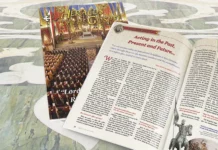The main mission for which God created us is preceded by countless others in our daily life. If we have learned to be generous in the daily struggle, so will we be at the decisive moment.
How often do we have the opportunity to admire the wonders of the plant world, enjoying their fruits and perfumes. However, we seldom consider the thousand “difficulties” that the plant went through to reach that stage: the seed died, adapted to the soil, became a small sprout, survived the bad weather, the ants, the droughts, the winds, and even withstood being trampled on by passers-by. But, finally, it prevailed, grew and reached its full splendour!
This journey through difficulties is found not only in the life of a small plant, but in any project that is undertaken. Admiring, for example, the imposing Cologne Cathedral, who would dare to doubt that countless obstacles had to be faced until its construction was finalized? Although often forgotten by men, the sufferings and struggles of those who contributed to the outcome of such a great achievement are most certainly kept in the heart of the Creator, for whom no one is an anonymous hero. And, over the centuries, they help many faithful souls to obtain graces.
No life is exempt from struggle
All this is just a symbol of what transpires within the children of God. He created each one of us through the immense generosity of His love, so that we might grow in holiness, building up virtues in our soul. He entrusted us with a specific mission, and for its complete fulfilment, He supports and accompanies us with His grace.
However, the path to accomplishing our mission is not travelled without crosses, perplexities, trials, renunciations and even failures. The idea of a life in which everything proceeds according to plan, without suffering, does not correspond with reality. The Divine Master already warned us: “If any man would come after Me, let him deny himself and take up his cross and follow Me” (Mt 16:24).
Throughout our lives, Providence often demands our generosity, in the manner of the little seed that must die in order to spring up into a verdant tree. How, then, do we prepare ourselves to take the steps which the Creator calls us to take?

A soul who knew how to render her “fiat”
Upon opening the Holy Scriptures we find numerous examples of chosen souls who, when the time came to take the necessary step to fulfil their mission, were able to say “yes”, as Mary did in Nazareth when She said her “fiat” to the work of Redemption.
One of these heroic figures we find in the Book of Judges. She is a woman whose past is unknown, but who marked history as a model of fidelity at the “H-hour”: Jael, wife of Heber the Kenite.
The Old Testament narration of her glorious feat begins when Deborah, judge and prophetess, calls Barak, Abinoam’s son, and orders him on behalf of God to mobilize ten thousand men from the sons of Zabulun and Nephtali to fight against the Canaanites. He accepts the order on one condition: that Deborah accompany him. The prophetess agrees, but predicts: “the road on which you are going will not lead to your glory, for the Lord will sell Sisera into the hand of a woman” (Jgs 4:9).
The battle was a resounding success: God was with them and overpowered the enemy general, who had to abandon his chariot and flee on foot (cf. Jgs 4:15). All that remained, for a complete victory, was to find and detain him.
However, while Sisera sought refuge, Jael, a shrewd woman, taking advantage of the difficult situation he was in, offered to help him. She invited him to enter her tent and he promptly accepted. He helped himself to what she offered him and fell into a deep sleep, asking her beforehand to remain at the door, and to tell no one of his whereabouts.
The crowning moment of this admirable and brave woman’s life had come… The complete victory of the chosen people was in her hands and Jael, without fear, said “yes” to the bold act that God was asking of her at that moment: she “took a tent peg and took a hammer in her hand, and went softly to him and drove the peg into his temple, till it went down into the ground” (Jgs 4:21).

With her mission accomplished, she went out to meet Barak and immediately gave him the news that allowed him to proclaim victory: the enemy was lying dead in her tent with a peg driven through his head. “So on that day God subdued Jabin the king of Canaan before the people of Israel” (Jn 4:23).
A heroine who deserved to participate in the victory
What impresses us the most in Jael’s attitude is her assurance in acting, her combativeness, determination and ingenuity. Without needing to have recourse to human advice, she discerned the exact moment to do what God had called her to do. Faithful in following that interior voice, she defeated the enemy while unwittingly fulfilling the prophecy made by Deborah: “the Lord will sell Sisera into the hand of a woman” (Jgs 4:9).
How did she prepare herself to execute God’s will so wisely at the “H-hour”?
As has been noted, nothing is known of her past, for only this fact of her life is narrated in the Scriptures. But, based on the premise that nemo repente fit summus,1 and that important works are always preceded by many difficulties, we can speculate about how Jael’s life must have been before overcoming the Canaanite general. Over the course of her existence, she had undoubtedly managed to overcome many other “Siseras” within herself, fruits of the bad tendencies that everyone has as a result of original sin.
How had she conducted herself with regard to temptations and bad inclinations since childhood? She could not possibly have been a relativistic person, concerned only with her own comfort. Certainly, she would have always had her duty foremost in mind, especially her duty towards God, and always tried to courageously face the things that she found most difficult.

We would be mistaken to imagine that Jael’s life was a succession of triumphs. The firmness with which she faced Sisera and the wisdom with which she acted in a split second are evidence of a continuous and vigilant battle for fidelity to the Creator. Consequently, she went down in history as a heroine with whom God wanted to share the victory.
We are called to conquer other “Siseras”
Our mission will certainly not be to encounter a “Sisera” at the entrance of the tent. But, who of us does not carry in our soul “Siseras” that need to be extirpated? It could be a tendency to pride, laziness, ambition, envy, slander, self-indulgence, the lack of an upright conscience, or so many other vices that populate our interior at every moment, wanting to gain ground in our hearts.
In order to extirpate them, we must be radical like Jael: without faltering, with energy and courage, we need to “drive the peg” into the defects that impede our spiritual progress. Without hesitation, we must ask for the help of divine grace and expel from our soul everything that separates us from Our Lord Jesus Christ.
Let us keep in mind, however, that the main mission for which we were created is preceded by countless others. If we are generous in our daily struggle, making strides towards the perfection that God asks of us, we will also be generous when He presents us with something greater. In this way, from battle to battle, our eyes fixed on the Redeemer and on Mary Most Holy, knowing that our strength and victory comes from them, we will be preparing to be faithful, like Jael, at the decisive moment of our specific mission.

Without a doubt we are more fortunate than Jael, since, having been born after the coming of the Redeemer, we have benefitted much more from His Blood, and we have received His Mother as our own. She, who is the strength of the weak and the solace of the wretched, will help us in our arduous battle! ◊
Notes
1 Latin saying that means: “No one becomes great overnight.”







